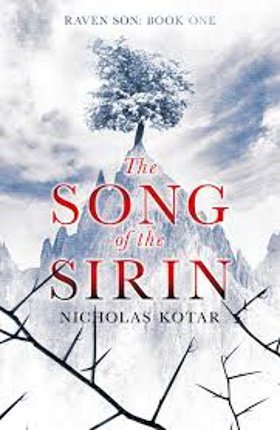What has happened to Vasyllia? How could we have allowed this to happen in our own house?
Just down the lane, a doctor in the pantaloons of the merchant class applied some sort of creamy poultice to the sores of a pregnant woman. His hands were caked with the white cream, and his goat-beard was smeared with all manner of dirt and blood. But he didn’t seem to notice. In fact, the dirt only made his hazel eyes shine brighter. They looked like little suns. Sabíana, mesmerized, came to watch what he did. He looked up at her, recognized her, but looked back down at his work without acknowledging her presence. Her momentary wounded pride faded when she saw how pockmarked the young woman was. She was probably no more than twenty, but she looked over fifty.
“What does the poultice do?” Sabíana asked, feeling foolish for having nothing more erudite to say.
“It heals the sores,” said the doctor nonchalantly.
“Heals them?” That surprised her. From what she heard of the plague, it had no cure. “But what about the plague?”
“Plague?” He snapped his head at her, his eyes furious. “There is no plague. It is only lack of food, lack of water, and dirt. That is all.”
Sabíana’s head began to spin. She should have known. The Dumar hadn’t quarantined anyone. They had caused “the plague” in the first place.
“Guard!” she called, and four immediately appeared at her side. “You, inform the elders of the warrior seminary that every cohort is to be called to the marketplace this moment. Every merchant table and booth is to be disassembled, and tents for the refugees are to be built from them. You, go to the healers and tell them that the refugees are to be relocated to the second reach, and that they will need care immediately. You, go find the Marshall of the Dumar. He is to be told that there will be a collection of food, living necessities, and medicine from the houses of the third reach, beginning tomorrow morning. You, go to the palace and tell the scribes to await my coming. Warn the criers of city-wide circuits tonight and tomorrow. Why do you still stand here? Go!”
They went, bowing hastily. “Dear Feína,” she said silently. “The Pilgrim may have said that remaking the Covenant is beyond our hope, yet I will restore Vasyllia to its honor in spite of it all.”
“Highness!” The voice was behind her. She turned to see Rogdai in full armor, save for an uncovered head. “You are summoned to the palace, my lady.”
She understood.
“I come,” she said, and her voice cracked. As she passed, the soldiers inclined their heads. The whispers accompanied her out of the first reach: “The Black Sun. Our Black Sun.”

Dar Antomír’s eyes blazed with unearthly light as he lay on his deathbed. Sabíana understood it to be the last surge of life before the final dimming. He saw her and smiled, extending a bony hand. She took it—he was still so strong for a dying man—and fought to contain the tears. The light in his eyes was almost blinding.
“Sabíana,” he whispered frantically. “Listen to me, listen. I have seen a vision, a final gift. I knew I had few hours left to live, and I begged Adonais as I have never begged before, to tell me something of my sons. For I had no hope left.
“As I lay on my bed in gloom, I was in my chamber no longer. I stood at the edge of a stream fed by a cascade of falls. The river wove into a deep emerald pool, fringed with a dense assortment of birches, osiers, and hollies. Beyond the trees, jagged hills sheltered the pool from all wind. On three sides was the pool thus sheltered, but the fourth was a great tumbling waterfall.
“I walked to the ledge and there was no bottom in sight. I looked once more and saw a different sight—a dry marshlands with many rivers snaking through it. Two men ran across it, pursued by a shapeless darkness. Still a third time I looked, and I saw the Great Sea, interminable to the horizon, and in it lay an island from which grew a white sapling covered in golden leaves.
“Then I stood on the top of the tallest mountain in the world, and the earth was riven at my feet, riven and bleeding. A voice thundered at my right, coming from a pillar of a thousand eyes and a thousand wings, all of fire and light. It spoke these words to me:
“‘Behold, this is the place of death and the place of healing. Tell me, Dar of men. Will the water flow?’
“I said to him, ‘It will, for without it the world will wither and die.’
“He said, ‘It will, but only if the falcon sheds its skin, the swan spreads its wings, the bear forsakes its hunger.’”
At these last words, the fire within Dar Antomír simmered and began to fade.
“Father, not yet, please!”
“Do not grieve for me, my child. Do you not understand?”
“No, father, I do not,” her voice subsided to a hoarse whisper.
“The falcon is Voran’s blazon, the bear Mirnían’s. They are alive. And the swan is you, my love. It is your time now.”
His eyes wandered beyond Sabíana, smiling at something he saw there. She looked up to see a dark-haired Sirin, her face wet with tears. Sabíana found her strength returning.
“Taryna,” said the dying Dar. “I am ready. Take me with you.”
Sabíana walked out of the chamber, hardly conscious of anything except her grief and the need to hold it in, to not give it any quarter. Rogdai stood at the door. One look at her face, and he fell on one knee and took her right hand in his own shaking hands and kissed it. His face was hot to the touch. He looked up at her through his own veil of tears, and said, “Praise be to Darina Sabíana. May your reign be long, and may the holy gaze of Adonais shine upon you.”

Kalún had waited in the palace cherry grove for what seemed like hours. He was growing extremely displeased with Yadovír. He had had such high hopes for the young man. But all Yadovír seemed to do was run around, very busy and very solicitous on behalf of the Dar, though with little to show for the work of their conspiracy. With every passing day, the pestilence reached its pox-ridden hand closer to the third reach.
Something rustled in the trees. Yadovír squeezed himself between two trunks and nearly poked his eyes out on the groping branches.
“You do seem flustered, Sudar Yadovír, if I may be allowed the observation.”
Yadovír sighed in obvious exasperation.
“Otar, I know you expected me to arrange matters with greater alacrity. But I do have good news. All is in readiness for a meeting with the Ghan himself.”
“This Ghan travels with his own army?” Kalún was hardly a strategist, but it seemed a foolish way to conquer future tribute states. Unless the Ghan never intended to return to his capital city of Gumir-atlan.
“So it would seem, yes.” Yadovír did not seem perturbed by it. “At great personal danger to myself, I arranged an exchange of information with their camp. They made it clear that they would welcome us tomorrow night.”
“How are we supposed to do that? Walk out of the city and stride over to the enemy side? That should go over very well with the door wardens.”
Yadovír ignored the sarcasm. “The Raven’s escape, Otar Kalún. You know the old story, yes? Well, it seems at least part of it is true. There is a way out of the palace through the dungeons. An old passage into the forest below the city. Not many know of it, and those that do, think that it’s been blocked for centuries. But I was curious, so I checked. It is mostly blocked, but after some careful manipulation of the fallen rock, I found that one or two people will be able to squeeze through with a little difficulty.”
“How convenient. Can you guarantee our safety?”





















